“All good things must come to an end,” begins an Invasion pan by Variety‘s Dennis Harvey. “In this case, the lucky streak that’s made every adaptation of Jack Finney‘s 1955 sci-fi novel The Body Snatchers distinctive and effective, until now.
“Troubled production — of which the Wachowski brothers reportedly reshot at least a third after a cut by original helmer Oliver Hirschbiegel failed to please suits — emerges a slick but forgettable, characterless thriller. Lure of Nicole Kidman, Daniel Craig‘s first post-Bond role and large-scale PG-13 action-horror could produce OK opening numbers, but steep falloff is guaranteed. Ancillary may drag pic into the eventual black.
“Perhaps auds will eventually get to see what German helmer Hirschbiegel, making his English-language feature debut, and scenarist David Kajganich intended in director’s-cut DVD form. Purportedly it was offbeat, politically barbed and quasi-documentary in style. Those qualities are MIA in the current version, whose occasional nods to earlier versions (Veronica Cartwright, memorable in the Kaufman version, has a brief role here) only serve as a reminder of how much better they were.”
Harvey’s idea makes basic sense. How could Warner Home Video not win by releasing the Hirschbiegel cut? At the very least it would make for an essential two-disc special edition DVD. No HE comment on the 93-minute Wachowski “suit” version until Friday, but including an alternative director’s cut would obviously heighten interest when the film debuts on DVD at the end of the year (or sometime in early ’08).
Month: August 2007
Stones doc pushed
“El Evento Cinematografico de la Decada!,” the copy states in the opening frames of the Spanish-language trailer for Shine a Light, the Martin Scorsese/Rolling Stones concert doc that’s been bumped from 9.21.07 to sometime in April ’08.

The official reason for the delay that the Stones’ European tour (wrapping at the end of this month) will keep Mick, Keith and Charlie from doing a full-court press promotion to plug the late September opening. And yet the tour dates and the 9.21 opening were obviously set many months ago. If the Stones wanted to rest after the tour Par could have just pushed the release back to October or November or December?
Variety‘s assessment is that “rather than enter the overcrowded award-season months of October, November or December, the principals involved in the Scorsese project opted for an April date.”
Except the bump-back leaves Paramount proper with just Beowulf (out 11.16) as the only Par-produced movie on ther fall slate. Everything else is DreamWorks-produced (The Heartbreak Kid, Things We Lost in the Fire, Bee Movie, The Kite Runner), reiterating all the more that the proper company name is Dreamamount.
I know that Shine a LIght was being assembled earlier this year and that a rough cut was shown to Paramount suits last May, and yet a source told Variety that “it was a tight schedule…everybody felt it was getting rushed.” Eight months of editing is a rush job?
Limousine driver
Twelve or thirteen years ago I got a very friendly call from a producer on the Sony lot. I knew who he was but had never spoken to him or called his office about anything. “Jeff! Howya doin’?” His tone was car-salesman chummy. Almost like a guy trying to pick up a girl at a bar. I didn’t know what to say except “Uhhm….good! How are you?” It went on like that for another eight or ten seconds until he realized he’d dialed the wrong Jeffrey Wells. “Oh…uhhnn, okay…well, bye!”
Turned out there was an L.A. guy with the same name who drove a limousine, and lived at the time somewhere near Playa del Rey or Manhattan Beach, and was apparently very well liked by industry execs. That’s still the case because an assistant to a director-writer friend called yesterday looking for the same guy. Nice to know he’s still doing well after all this time. He doesn’t Google, even when you type “limousine driver” in front of the name. And he’s not findable through Switchboard. But he’s very popular with certain flush types, and very trusted.
NY Film Festival lineup
The Reeler’s Stu Van Airsdale has the lineup for the 2007 NY Film festival (9.29 to 10.14), and a good portion seems like a replay of last May’s Cannes Film Festival. There are, however, some notable fresh-pick exceptions — Wes Anderson‘s The Darjeeling Limited for the opening-nighter (old news), Noah Baumbach‘s Margot at the Wedding (good cast, ample star wattage), Brian DePalma‘s Redacted (comeback?) and Todd Hayne‘s I’m Not There (an ambitious, multi-thread Dylan film with a top-drawer cast opening at the Film Forum..what’s that about?).
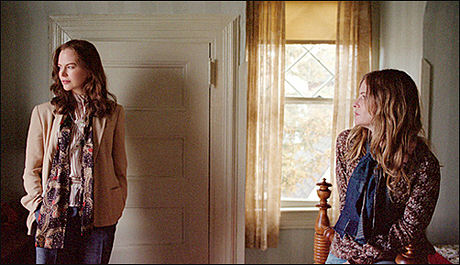
Other for-the-most-part-unseen choices include Carlos Saura‘s Fados, Sidney Lumet‘s Before the Devil Knows You’re Dead, Ira Sachs‘ Married Life, Claude Chabrol‘s A Girl Cut in Two, Eric Rohmer‘s The Romance of Astrea and Celadon, andJohn Landis‘s Mr. Warmth (a Don Rickles portrait)…that’s ten plus two or three newbies I’m ignoring.
I’m also counting twelve Cannes titles: Joel and Ethan Coen‘s No Country For Old Men (centerpiece), Marjane Satrapi & Vincent Paronnaud‘s Persepolis (closing nighter), Christain Mungiu‘s 4 Months, 3 weeks, 2 Days (the Palme D’Or winner), Julian Schnabel‘s The Diving Bell and the Butterfly, Hou Hsiao-hsien‘s The Flight of the Red Balloon, Abel Ferrara‘s Go Go Tales (missed it at Cannes), Catherine Breillat‘s The Last Mistress, Bela Tarr‘s The Man From London (serious pacing problems), Gus Van Sant‘s Paranoid Park (underwhelming), Carlos Reygadas‘ Silent Light and Juan Antonio Bayona‘s The Orphanage (a brilliant sophisticated spooker).
There’s also three interesting-sounding docs — Murray Lerner‘s The Other Side of the Mirror: Bob Dylan Live at the Newport Folk Festival, 1963-1965. Jia Zhang-ke’s Useless, and a nearly four-hour-long documentary (238 minutes, to be precise) from Peter Bogdanovich called Tom Petty and the Heartbreakers: Runnin’ Down a Dream.
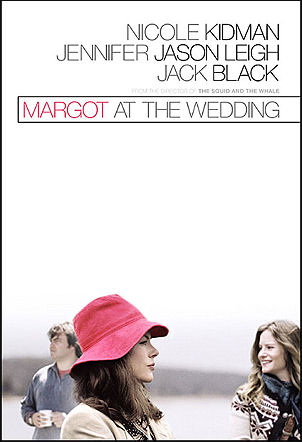
Black-and-white scope
In re-reading Guardian critic Peter Bradshaw‘s comments about Control that ran last May, I was reminded that a lot of the enjoyment I took from Anton Corbijn‘s film was due to the soothing visual bathwater effect of watching any film shot in black-and-white widescreen (2.35 to 1), which is perhaps my favorite mode of all.
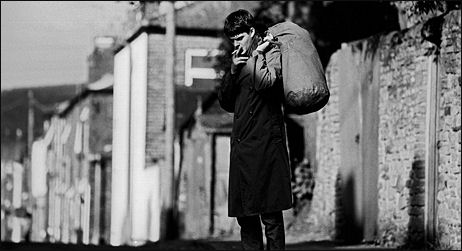
“Corbijn’s movie is shot in a stunning high-contrast monochrome,” Bradshaw wrote, “perversely turning…grimness into grandeur. It effortlessly revives a British cinematic style that you might call beautiful realism, reaching back to Christopher Petit‘s Radio On, and further back to Tony Richardson’s The Loneliness of the Long Distance Runner and A Taste of Honey.
Corbijn developed his love of black-and-white from his photography and music-video background, but credit should also go to Control‘s cinematographer Denis Lenoir (The Clearing, Demonlover).
To me, any film shot in monochrome “scope” — a format that has all but disappeared — is reason enough to pop for a ticket or a rental. I’ll sometimes rent DVDs of somewhat mediocre films (i.e., The Longest Day) if they’ve been shot this way. I’m even tempted to watch the newly remastered version of Jailhouse Rock (an otherwise so-so, in-and-out Elvis Presley film) because of Robert J. Bronner‘s monochrome scope lensing. But you have to know which films have been shot this way — DVD jacket covers never tell you.
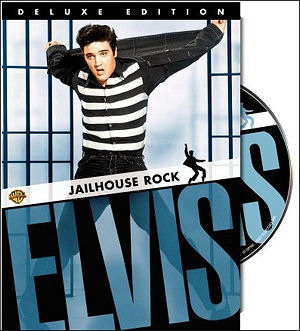
Woody Allen‘s (and particularly Gordon Willis‘s) Manhattan is one of the more glorious manifestations. Other top-of-my-head faves are Robert Rossen‘s The Hustler, Francois Truffaut‘s Jules et Jim and Shoot the Piano Player, Jack Clayton‘s The Innocents, Joseph Losey‘s The Damned, Robert Wise‘s The Haunting, Jack Cardiff‘s Sons and Lovers, Akira Kurosawa‘s High and Low, Luis Bunuel’s Diary of a Chambermaid, Michelangelo Antonioni‘s L’Eclisse, Martin Ritt‘s Hud, etc.
Black-and-white has been commercially dead for decades. Philistine tastes in movies have long stipulated that everything made for theatrical has to be in color — it’s a settled issue. My kids have always hated monochrome films, and even now they’ll groan slightly if I pop one into the DVD player. Black-and-white scope is doubly perverse in this sense, I suppose, but I so miss it. For this reason I can’t wait for the Control DVD to come out early next year so I can buy it and keep it forever.
Whitty on Kidman, Cruise, “Invasion”
Newark Star Ledger critic Stephen Witty asked last night if The Invasion (Warner Bros., 817) could be read as a metaphor about Nicole Kidman‘s experience with Scientology and Tom Cruise.
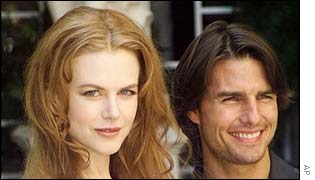
Kidman, after all, is “playing an ambitious working woman and devoted mother who — some years back — had a really ugly divorce from her dark, narcissistic husband,” Whitty observes. ” Who has now re-entered her life, accompanied by a hive-like entourage of humorless, robotic friends.
“Add into the mix that Kidman’s character — unlike earlier versions of Invasion of the Body Snatchers, in which the hero was a physician — is a psychiatrist. Worse, she’s that bete noire of Scientologists, a drug-dispensing psychiatrist — one who even prescribes mood-altering medicines to her own kid.
Whitty acknowledges that The Invasion, “nominally directed” by Oliver Hirschbiegel, “went through a massive post-production overhaul by the V for Vendetta team, which makes crediting anyone with anything fairly suspect. [And yet] the bland villains in this movie looked an awful lot like the folks giving those ‘free stress tests‘ just outside the movie theater. And the scene where Kidman knocked her on-screen husband out cold drew the biggest — and happiest — cheers of the screening.”
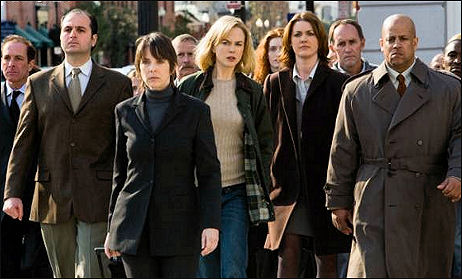
And of course, the Munich-born Hirschbiegel was reared in a country with a government currently known for its anti-Scientology views and policies. I’m obliged to be silent about The Invasion until Friday morning, but given the other socio- political echoes and allusions in this film, it will be fun trying to sort out whether these were included in the Hirschbiegel version of The Invasion (Dave Kajganich is the credited IMDB screenwriter) or whether they were more from the hand of the Wachowski Brothers, who allegedly re-scripted and re-shot the Hirschbiegel version by more than 50%.
Coughing after “quaqmire”
“Once you remove Hussein’s government what are you gonna put in its place?….[it would have been] a quaqmire…for the 146 Americans killed in action it wasn’t a cheap war…how many more dead Americans was Saddam Hussein worth?” This 1994 clip of Dick Cheney explaining the reasons for not invading Iraq during the ’91 Gulf War began circulating last Sunday. What got me was the hilarious cough from the interviewer right after Cheney says “quaqmire.” Anyone who’s ever performed or given a lecture knows from coughs. They’re involuntary, a kind of instant vox populi.
“Nothing is Private” in ’08?
I wrote last April about my enthusiasm for Alan Ball‘s Nothing is Private, or for his script rather — a nicely honed, richly drawn adaptation of Alicia Erian‘s “Towelhead,” which is an early ’90s period piece about ethnic provocations among some Houston neighbors, and particularly about a young girl’s coming of age. Then I got all jazzed in July about the film going to the Toronto Film Festival, and so I put it in the Oscar Balloon for possible Best Picture, Best Actress and Best Adapted Screenplay heat. Okay, maybe a little precipitant. Possibly.
Then today a publicist noted that this Scott Rudin film is still without a distributor, and that it will be difficult to get lined up for a strategic release and a possible award campaign before 12.31.07, and that it seems much more likely to be an ’08 release.
Maybe. The word on this film has been nonexistent, but maybe Rudin wants it this way in order to maximize the impact when it plays at Toronto. I can only once again direct attention to this AICN review from a guy named “Rocksalt” that ran four or five months ago. Obviously not much to go on, but between this and the script I’m still very intrigued.
The film costars Summer Bishil, Aaron Eckhart, Maria Bello, Peter Macdissi, Toni Collette and Eugene Jones. It’s basically about a 13 year-old half-Arab, half-Irish girl named Jasira (Bishil) getting sexually involved with two older guys while living with her strict Lebanese father.
High-def Sony Pictures Classics
The Sony Pictures Classics site has been upgraded into a new high-def deal. The stand-out thing are the friendly Sony employees who walk into the frame on the lower-right corner and say “welcome,” etc.
Distinguishing the difference
“My guess is that many parents have a hard time distinguishing the difference between ‘innuendo’ and ‘sensuality” — Harvard School of Public Health associate professor Kimberly Thompson speaking to L.A. Times writer Josh Friedman about definitions offered by the MPAA to explain why a film has been rated what it’s been rated..
Another Iraq-Afghanistan story
Another story about Hollywood’s Iraq-Afghanistan movie fetish. If you’re late to the party you have to add something that isn’t commonly known, right? A new angle, attitude, perspective.
“Control” trailer isn’t up
Anton Corbijn‘s Control (Weinstein Co., 10.10), the sad but visually arresting story of doomed Joy Division singer Ian Curtis, is less than eight weeks from opening in this country, and there’s still no full-on website to support it. Whassup with that? This is one of the best films of the year so far, and the cost of creating a tight, attractive, professional-level website with all the right bells and whistles is relatively small. If you know how to work it, that is.
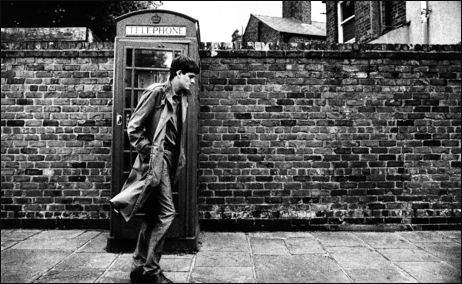
Sam Riley in Anton Corbijn’s Control.
All the Weinstein Co. has put up is a single information page with a synopsis, a photo of star Sam Riley (who gives one of the year’s most arresting lead performances, no question) and a little blah-dee-blah about Curtis and Joy Division and yaddah-yaddah.
The Weinstein site doesn’t even feature a link up to this new Control trailer, which is now sitting on a My Space page.
“The mark of any exceptional film is the won’t-go-away factor,” I wrote just after seeing it last May at the Cannes Film Festival. “A film that doesn’t just linger in your head but seems to throb and dance around inside it, gaining a little more every time you re-reflect. This is very much the case with Anton Corbijn‘s Control, the black-and-white biopic of doomed Joy Division singer Ian Curtis.
“I finally saw Control at a market screening last Wednesday night (5.23) at the Star cineplex, and it’s definitely one of the four or five best flicks I’ve seen at Cannes — a quiet, somber, immensely authentic-seeming portrayal of a gloomy poet-performer whom I didn’t personally relate to at all, but whose story I found affecting anyway.
“Corbijn, a music-video guy, was obviously the maestro, but a significant reason why so much of Control works is newcomer Sam Riley, who portrays Curtis as a guy who was unable to throw off that melancholy weight-of-the-world consciousness that heavy-cat artists always seem to be grappling with. There is no such thing as a gifted writer/painter/poet/sculptor/filmmaker who laughs for the sake of laughing and does a lot of shoulder-shrugging. Everything is personal, and everything hurts deep down. And Riley makes you feel what it’s like to be a guy who just can’t snap out of it.”
Again, check out the new trailer. It’s the best one I’ve seen so far, and I’ve been looking at Control-related stuff all summer.
